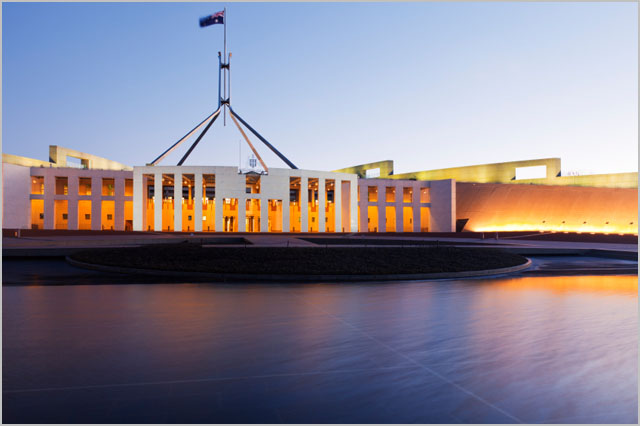
blog Remember how a damning report was published in October 2012 noting that the IT systems running Australia’s Federal Parliament were a complete shambles? Remember the litany of complaints which politicians and their staff filed with the Department of Parliamentary Services over the issue? Well, things might be gradually improving at the Parliament courtesy of its new chief information officer, but at least one thing is going to remain the same: The IT services firm servicing the politicians’ electorate offices.
According to a media release issued this morning, the contract to maintain the electorate offices of Australia’s MPs and Senators has, since 2003, been held by local firm CSG, which was bought by diversified Japanese technology giant NEC in May 2012. According to NEC’s media release, the company has retained the work following a competitive tender. We hope Eija Seittenranta gives NEC different instructions than CSG received previously from the Department of Parliamentary Services. Because if last year’s report was any indication, the nation’s politicans weren’t precisely getting the IT support they were looking for. This morning’s media release:
“NEC Australia, a leading technology solutions and services company, has secured a three-year contract with the Department of Parliamentary Services (DPS) to provide nationwide IT support at the electorate offices of Australian senators and members of Parliament.
DPS is the principal support agency for Parliament House. It provides administrative, operational and ICT support to the Department of the Senate and the Department of the House of Representatives to ensure the effective operations of Australia’s Parliament.
Under the new contract, NEC Australia will provide managed ICT services and support to the electorate offices of each of the senators and members at 260 locations in every state and territory across Australia. The three-year contract commenced in April 2013 and covers more than 260 servers, 1300 desktops, 300 laptops and 700 printers.
“NEC Australia is a long term service provider to the Department of Parliamentary Services and we are pleased to continue providing the highest quality support to the Department and its clients. Our multi-vendor technology solutions approach, backed by NEC Australia’s reliable, flexible and nationwide support capabilities, has yet again proven to be the right choice for our customers,” said Colin Cooper, General Manager Federal Government Business, NEC Australia.
The previous support contract with DPS had been in place since 2003 and was held by CSG IT Services. CSG IT Services was acquired by NEC Australia in May 2012. DPS awarded the renewed contract to NEC Australia following an open tender process for the provision of electorate office IT support.
The contract renewal demonstrates the ongoing success of NEC Australia’s transformation and position as a leading Australian ICT services firm, offering customers deep expertise in ICT consulting, application development, business process solution management, and desktop and infrastructure management.”
Of course, ultimately we suspect that most of the problems which were so evident at the Department of Parliamentary Services in the aforementioned report stemmed from poor IT leadership at the department itself — rather than poor performance on CSG’s part in fulfilling its contract duties. It’s well known in IT management circles that outsourced IT services need to be carefully and strictly managed by internal IT staff on the customer end — or else the outsourcing firms tend to get a little ‘off-hook’, so to speak. And if there isn’t much budget for necessary upgrades — as we suspect has been the case at DPS for some time — then things get even worse. Let’s hope this new contract with NEC and DPS’ new IT leadership in the form of Seittenranta’s appointment helps get things back on the straight and narrow.

Agree with your analysis, Ren – as an outsourced service supplier you can only supply the specific services that have been contracted. If that doesn’t include ongoing development, you get none until you ask for it. If that means no consulting, you don’t even get advice on what needs improving where, until you agree you want it. That can cause clients to try to blame the outsourced service supplier when things pile up so badly it all starts to collapse, but the reality of outsourcing is you must have the budget and the contracts in place to provide all necessary services to keep everything running and provide whatever ongoing development, support and improvement is necessary for your environment.
Pencil pushing bean counter managers and Directors that don’t understand this, that think they can improve the bottom line by cutting what they see as ‘wasteful’ IT spend are due for the same rude awakening that comes to this scenario every time – IT must be prioritised as a key foundation of the business, because that’s exactly what it is. It is not a superfluous waste of resources that could be more efficiently allocated (well, as long as you have sufficiently qualified staff making key decisions, of course). If IT needs restructuring it must be done with thorough understanding for the complexity of the situation – you cannot apply a broad brush in the name of general ‘cost saving’ unless you want to break things; you run the risk of undermining your business functionality to the point of failure. This is a reality that government departments typically have a very poor understanding of – it’s a culture that is going to cause a lot more problems before it starts to get better.
Comments are closed.